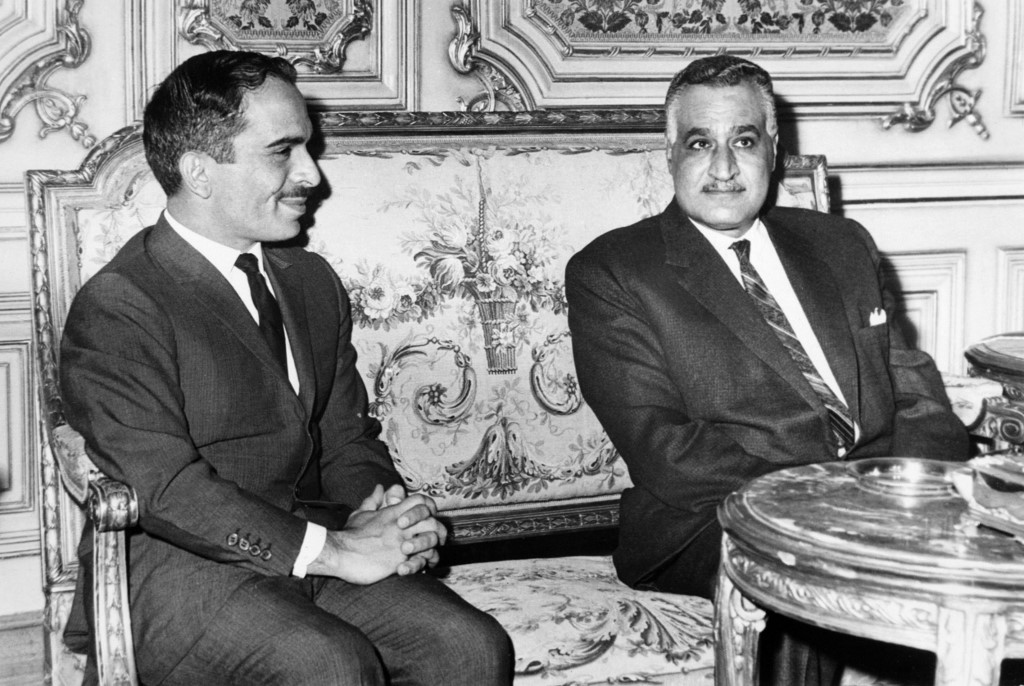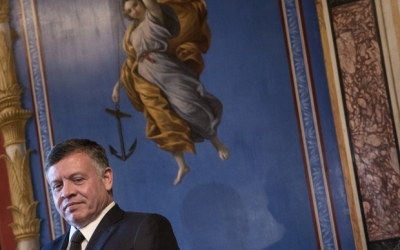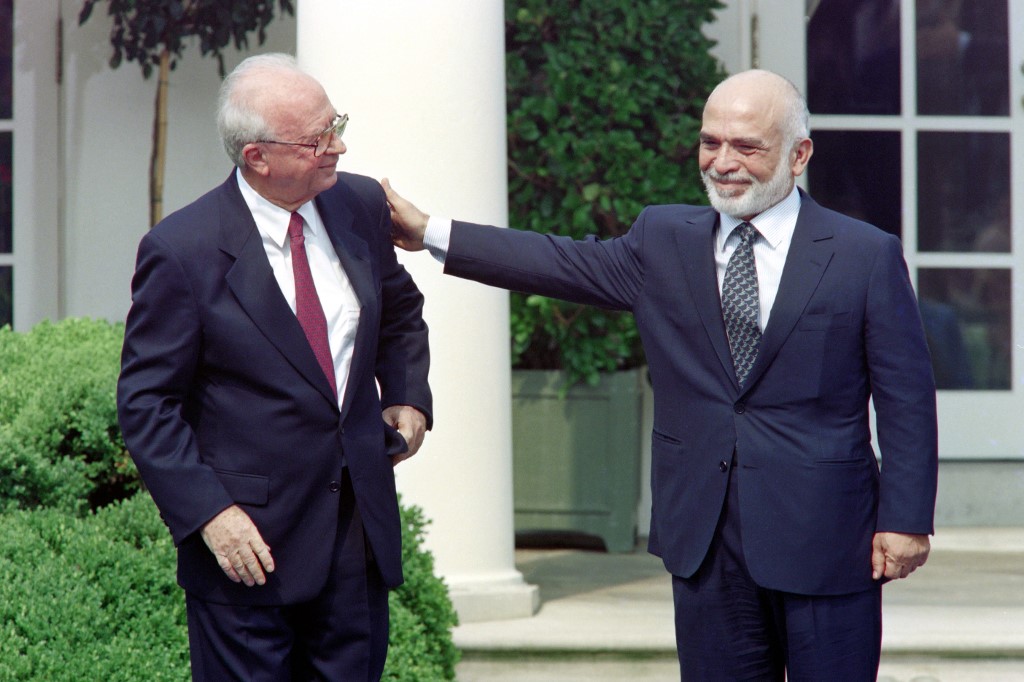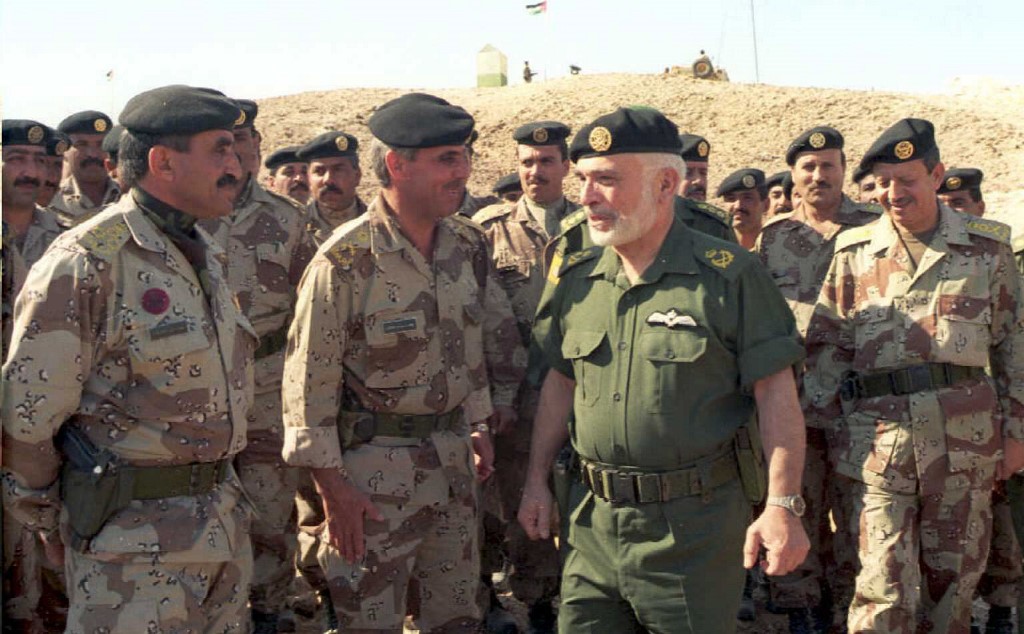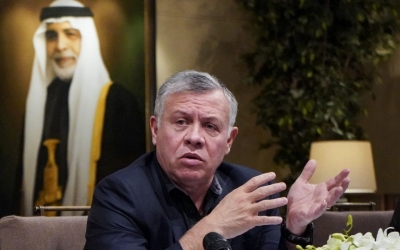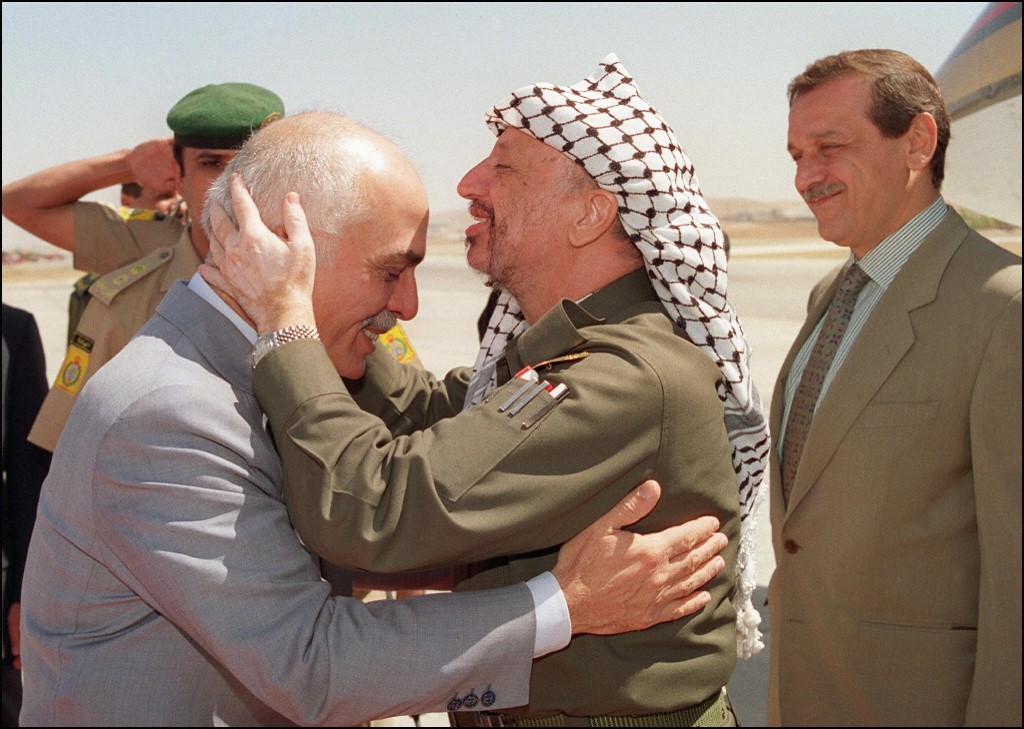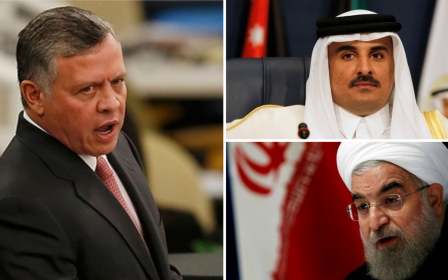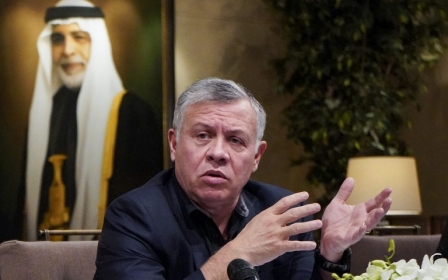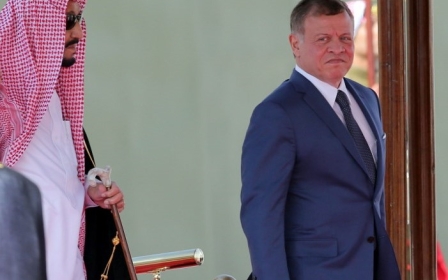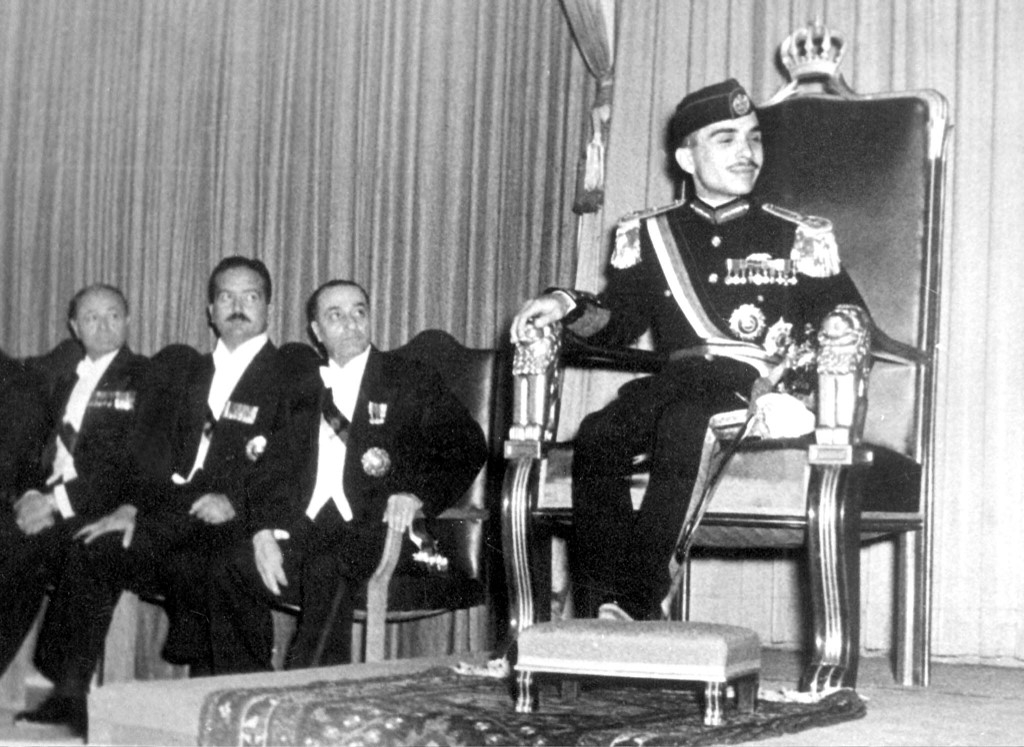
Peacemaker: The legacy of King Hussein of Jordan
Israel likes to present itself to the world as a small, peace-loving country surrounded on all sides by Arab predators. Its actual record, however, largely consists of wars of aggression, territorial expansionism and diplomatic intransigence.
On the Arab side, amid deep hostility at the popular level, there have been some notable peacemakers. One was former Egyptian President Anwar Sadat, who was awarded the Nobel Peace Prize for the peace treaty he signed with Israel in 1979. Another was King Hussein of Jordan, the father of the present king, Abdullah II.
Collective amnesia
King Hussein died of cancer on 7 February 1999, aged 63. The twentieth anniversary of his death was ignored in Israel. There were no reappraisals, tributes or accolades. Given the king’s popularity with the Israeli public and given that he was Israel’s best Arab friend, this collective amnesia was somewhat disappointing.
Moreover, the king did not stand alone as a friend. He was a scion of the Hashemite dynasty, descendants of the Prophet Muhammad, who were marked by an enlightened attitude towards the Jews and a moderate approach towards the Zionist movement.
New MEE newsletter: Jerusalem Dispatch
Sign up to get the latest insights and analysis on Israel-Palestine, alongside Turkey Unpacked and other MEE newsletters
There have been four Hashemite kingdoms in the last century. First was Sharif Hussein bin Ali’s short-lived Kingdom of the Hejaz, which was overrun by Ibn Saud in 1925. The second was Faisal’s Arab Kingdom of Syria, which lasted just over four months in 1920 until the French drove him out of Damascus. As a consolation prize, the British procured for Faisal the throne of Iraq in 1921.
The survival of the Hashemite Kingdom of Jordan is King Hussein's greatest achievement and enduring legacy
As king of Iraq, Faisal embraced all minorities -especially the Jewish community. My mother Aida, who is 95, remembers clearly a visit to her school in Baghdad, the Alliance Israelite Universelle girls’ school, by King Faisal, accompanied by the chief rabbi. The Hashemite Kingdom of Iraq ended in 1958 in a bloody coup and the defenestration of the royal family in Baghdad, my hometown.
The fourth country is the Hashemite Kingdom of Jordan, founded by Winston Churchill as an emirate in 1921, and still standing to this day. The survival of the Hashemite Kingdom of Jordan is King Hussein’s greatest achievement and enduring legacy. Under his leadership, Jordan weathered all the crises, revolutions, violence and wars of this endemically unstable region.
It was survival in the face of severe existential challenges, including the Palestinian issue, the threat from radical Arab nationalism, and the dangers posed by two of the region’s most aggressive and ruthless states: Syria and Israel.
Enlightened attitude
The other aspect of King Hussein’s legacy is the 1994 peace treaty with Israel. Indeed, if I had to sum up Hussein’s entire political career in one word, it would be peacemaker. I do not have the space here for a comprehensive assessment of King Hussein’s legacy. Instead, I would like to convey some personal impressions of the man, and to focus on one aspect of his 46-year reign: his relations with Israel.
The Hashemites had no problem with Jews, only with Zionists. Sharif Hussein bin Ali, the sharif of Mecca, had great respect for Jews as “the People of the Book” and educated his children in what became a family tradition. He was ready to welcome individual Jews to Palestine, but not the Zionist attempt to take over the country. It was precisely because he refused to endorse the Balfour Declaration that the British abandoned the King of the Hejaz to the tender mercies of his great rival, Ibn Saud.
King Hussein was equally enlightened in his attitude towards Jews and similarly troubled by the behaviour of the Zionists, and especially their territorial expansionism. I knew his late majesty very slightly but liked him a great deal. The two personal qualities that stood out from my contacts with him were humility and humanity. He also had platinum-grade social skills.
I am one of several biographers of his late majesty, but the title of my book – Lion of Jordan – was more or less imposed on me by Penguin Books. My original title was simply King Hussein of Jordan: A Life in War and Peace. For a biography to succeed, there has to be a certain degree of empathy on the part of the biographer towards his or her subject. Hostile biographies rarely make for good reading. In my case, the problem did not arise. On the contrary, the real risk was of toppling over into hagiography.
The king of realism
King Hussein apparently had no reservations about my writing his biography. He reportedly told Mustafa Hamarneh, a Jordanian academic who served for a short period as his press secretary: “I am happy that Avi Shlaim is writing a book about me because he is a Jew and an Israeli, he knows the history of the family, and he is a professor at Oxford.” These were my putative qualifications for serving as a biographer of an Arab monarch and descendant of the Prophet Muhammad.
In saying that I knew the history of his family, Hussein was most probably referring to my controversial 1988 book Collusion Across the Jordan: King Abdullah, the Zionist Movement, and the Partition of Palestine. The thesis advanced in this book is that in 1947, the Hashemite ruler and the Jewish Agency reached a tacit agreement to divide Palestine between themselves, at the expense of Palestinians.
A subsidiary thesis is that Britain knew and secretly approved of this agreement because of its hostility to the Palestinian national movement led by Hajj Amin al-Husseini. This book was banned in Jordan and is still banned today. Hussein, however, read it and apparently understood that the book was not an attack on his grandfather, Abdullah I, but a defence, inasmuch as Abdullah I was the only Arab leader in 1948 with a realistic assessment of the military balance of power.
Abdullah I was the king of realism. So was Hussein bin Talal. In 1951, as a boy of 15, Hussein witnessed the assassination of his beloved grandfather outside al-Aqsa Mosque in the Old City of Jerusalem. Abdullah I had prearranged to follow Friday prayers with a secret meeting with two Israeli representatives, Reuven Shiloah and Moshe Sasson. In other words, Abdullah I persisted in his efforts to make peace with the Israelis literally until his dying day.
When Hussein ascended to the throne in 1953, following the abdication of his father Talal, who suffered from mental illness, he consciously followed in the footsteps of his grandfather and mentor. Indeed, Hussein personified the Hashemite legacy of respect for Jews, pragmatism and moderation.
Military balance
This brings me to Hussein’s relations with Israel. The key was realism – a sober assessment of the military balance, a realisation that the Arabs had no chance of defeating Israel on the battlefield. The alternative to war was diplomacy.
In 1996, Hussein granted me a two-hour interview for The Iron Wall, my book on Israel and the Arab World. He kept calling me “sir”, which to me, as a humble academic, was both strange and charming. More importantly, he was astonishingly frank. It was the only time that he spoke on the record about his secret meetings with Israeli officials. After his death in 1999, I published an edited version of the interview.
The greatest Arab taboo was speaking with the enemy. By meeting with the Israelis, King Hussein broke this taboo. I asked him why. He replied: “For whatever reason, we had a neighbour, a people who were close to us historically, whom circumstances in the world had forced into our region. The dilemma was how to avoid mutual destruction and how to find a way of living together once again and not to continue to pay the high price which was not fair on either side.
“My purpose throughout, since the 1960s, was to try to see if there is any way to resolve the problem … I had to explore, I had to find out what is the thinking in Palestine. There is no future in war, there is no future in further suffering for people, either they or us. So, one had to know. One had to break that barrier and begin a dialogue whether it led anywhere immediately or not. But it was important to have it direct and first-hand and not to let other players manipulate us.”
Hussein added that, by chance, he had a friend who looked after his health in London. This was a reference to his personal physician, Emanuel Herbert, who was a Jew and an ardent Zionist. One day, Herbert suggested the possibility of a meeting with a senior Israeli diplomat, Yaakov Herzog, son of the chief rabbi of Ireland and an ordained rabbi himself. And that is how it started – in the home of Herbert in St John’s Wood.
Extraordinary dialogue
The secret meetings with Israeli officials went on from 1963 until the conclusion of the peace treaty in 1994. In my biography of the king, there is a table with the dates, names of participants, and venues of these meetings. Many meetings took place in London, some in Amman, some in an air-conditioned caravan in Wadi Araba, some on the royal yacht in the Gulf of Aqaba, and one in the Mossad headquarters north of Tel Aviv.
I have documented, from the private archive of Herzog, 42 secret meetings. There might have been others. But the bare list gives an idea of the scope and seriousness of this extraordinary dialogue across the battle lines.
The king offered Israel total peace for total withdrawal, but both the tone and the substance of the dialogue had changed
In June 1967, Hussein joined Egyptian President Gamal Abdel Nasser and Syria in the war against Israel. It was a disastrous decision, but as he told me, he felt he had no real choice: Either he joined the Arab nationalists in what was popularly hailed as “the battle of destiny”, or his country would tear itself apart in a civil war. Hussein lost half his kingdom in the war, including the crown jewel, the Old City of Jerusalem. He spent the rest of his life in an unrelenting effort to pick up the pieces.
One positive thing that came out of the debacle was a new alliance between the king and Nasser against the Syrian hardliners, and a joint decision to rely on diplomacy to recover the occupied territories. Nasser told Hussein that recovering the West Bank was more urgent than recovering Egypt’s Sinai Peninsula, because of the large number of Palestinian civilians in the West Bank. He also authorised Hussein to talk to the enemy with this purpose in mind, but warned him not to sign a separate peace treaty.
The dialogue with Israel resumed as soon as the guns fell silent. The king offered Israel total peace for total withdrawal, but both the tone and the substance of the dialogue had changed. Herzog now treated Hussein like a headmaster reprimanding a naughty schoolboy. On substance, the Israelis proposed to keep 30 percent of the West Bank, including the Old City of Jerusalem. Hussein rejected the offer repeatedly. It was all or nothing, he insisted.
Protecting the kingdom
Despite the stalemate, the talks went on for years. Why did Hussein continue to meet with the Israelis, despite their palpable diplomatic intransigence and creeping annexation of the West Bank?
It was to protect what remained of his kingdom. He thought that if he continued to meet with the Israelis, they would be less likely to attack the East Bank of his kingdom or to want to topple the Hashemite monarchy and replace it with the Republic of Palestine. This threat was implicit in the rightwing slogan “Jordan is Palestine”, which suggested that the East Bank was a Palestinian state because the majority of its population was Palestinian, and thus there was no need for a second Palestinian state in the West Bank.
By talking with the enemy, Hussein incurred serious reputational damage. His enemies denounced him as a traitor to the Arab cause.
The facts, however, are that King Hussein did not yield one inch of Arab land in all his talks with the Israelis, and he was not the first Arab leader to make a separate peace deal with Israel. The first was Sadat and the second was former Palestinian leader Yasser Arafat. It was only after Arafat signed the deeply flawed Oslo Accord with Israel in September 1993 that Hussein embarked on negotiations that led to the peace treaty with Israel a year later.
Remarkable empathy
Conflict resolution requires empathy. Hussein’s empathy for the enemy was quite remarkable. He was also an educator. King Abdullah II told me that his father repeatedly impressed upon him the vital importance of understanding the other side’s point of view, of displaying sympathy, and of offering reassurance when talking to the Israelis. Because of their history and their suffering, Hussein explained, the Jews were obsessed with security, and one had to put that into the equation when negotiating with them. I heard the same thing from several other Jordanian negotiators, both soldiers and diplomats.
In former Israeli Prime Minister Yitzhak Rabin, Hussein found a genuine partner on the road to peace. They were both soldiers who knew the price of war and therefore turned to peacemaking. They also trusted one another. As the king observed in his interview with me, he often put himself in Rabin’s place, and Rabin did the same with him. By listening and being listened to, they discovered a common humanity.
The king’s popularity with the Israeli public was another asset in negotiations. He was Israel’s favourite Arab neighbour. He was told jokingly, on more than one occasion, that if he chose to run for office in Israel, he would win by a landslide.
King Hussein thought that the treaty he and Rabin negotiated was fair and balanced and that it met the essential interests of both sides. It gave Israel peace and normalisation, and it guaranteed Jordan’s security. The problem with the treaty was that it was not institutionalised; it depended to a perilously high degree on the personal rapport between the two leaders.
The assassination of Rabin by a Jewish fanatic was consequently a catastrophe for Hussein on both the personal and the political level. He spoke movingly, at Rabin’s funeral in the national cemetery on Mount Herzl, about his “fellow shepherd of the Jordanian-Israeli peace process”. He vowed, “to continue the legacy for which my friend fell, as did my grandfather in this city when I was with him and but a boy”.
'Buried the peace'
After the funeral, journalist Randa Habib saw Hussein standing on the terrace of the King David Hotel, with tears rolling down his cheeks. She asked him about his feelings. He replied: “I had come to West Jerusalem for the first time in my life in order to bury a friend.” There was a brief silence, and then he added: “I have the impression that today I have also, in some way, buried the peace.”
These were prophetic words. Rabin was succeeded by Benjamin Netanyahu, leader of the rightwing Likud Party and a proponent of the doctrine of permanent conflict. The contrast between Hussein’s magnanimity and Netanyahu’s malevolence could have hardly been more striking.
Having made with Rabin “the peace of the brave”, the ailing monarch now confronted an Israeli leader intent on imposing upon him the peace of the bully. From then on, it was downhill all the way. Netanyahu remained Hussein’s nemesis for the rest of his tragically short life.
Twenty years after his death is a suitable time to assess the life and legacy of Hussein bin Talal. There were mistakes of historic proportions, notably the June 1967 war. The mistakes, however, are offset by some major achievements.
One part of his legacy is the survival of the Hashemite Kingdom of Jordan, despite perpetual turmoil and turbulence in the region. A second, and closely related, part of his legacy is the peace treaty with Israel. An overall settlement of the Arab-Israeli conflict was beyond Hussein’s reach, but it was not for lack of trying.
No other leader strove as consistently, as indefatigably, and as wholeheartedly in pursuit of peace in the Middle East as did Hussein bin Talal. He received less than his due from either Israelis or his fellow Arabs for his efforts to resolve the conflict. History is likely to be kinder to him.
The views expressed in this article belong to the author and do not necessarily reflect the editorial policy of Middle East Eye.
Middle East Eye delivers independent and unrivalled coverage and analysis of the Middle East, North Africa and beyond. To learn more about republishing this content and the associated fees, please fill out this form. More about MEE can be found here.


